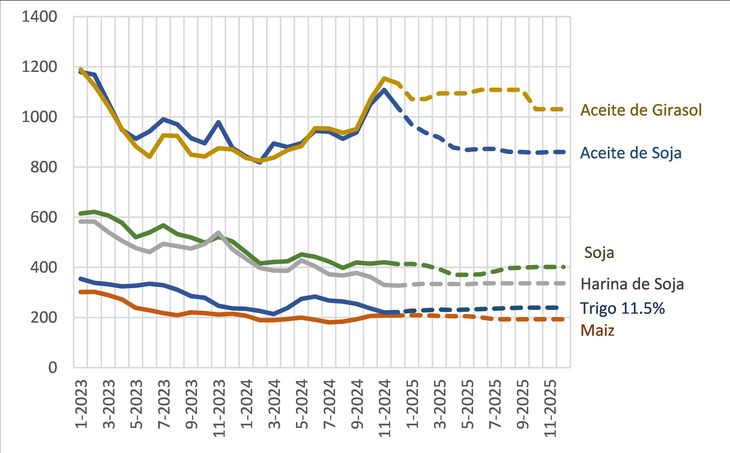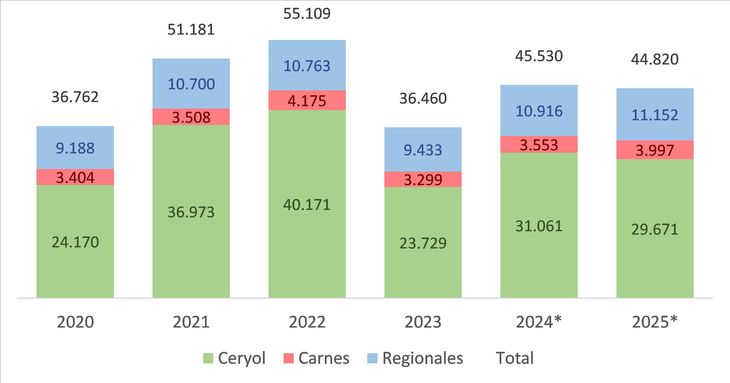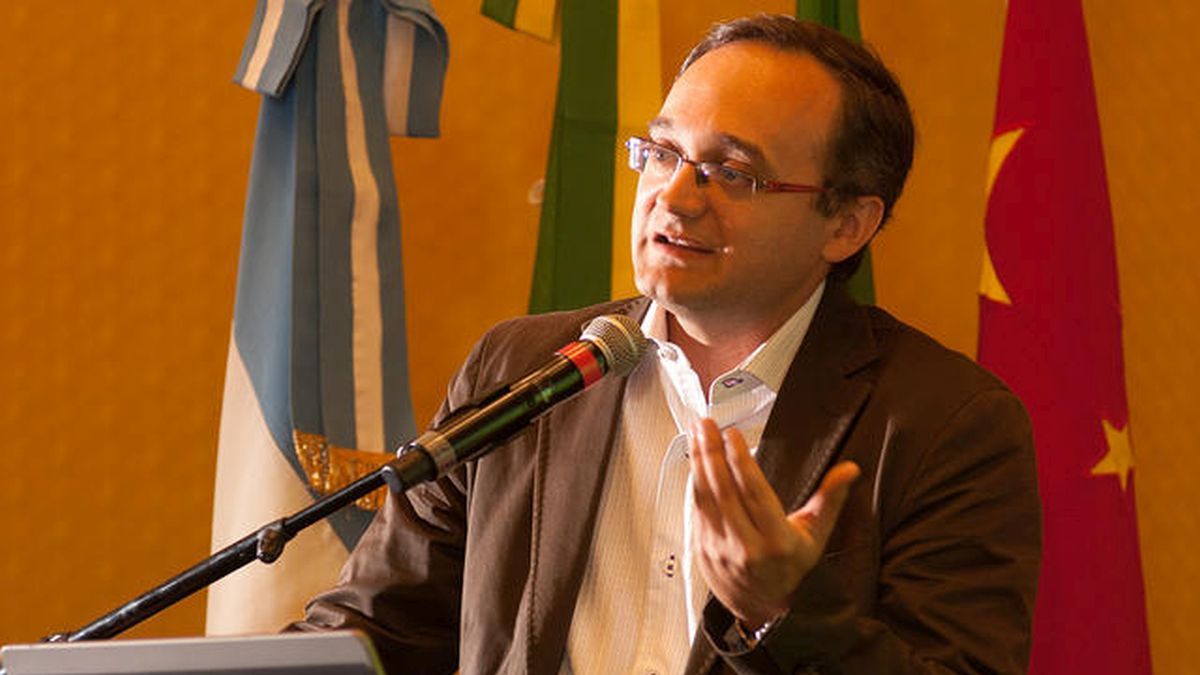Idígoras pointed out that the economic leadership has confirmed that “This type of change is here to stay throughout 2025”which forces the sector to ““find a way to be competitive and productive.” He anticipates that in the amount of dollars the 2025 campaign will be very similar to 2024. As of November the sector has earned more than 23,000 million dollars. In a report prepared by CIARA, it is estimated that exports from the agro-industrial complex would reach USD 44.82 billion during 2025, which represents a decrease of USD 710 million compared to the previous year. This fall is explained, in part, by the contraction in exports of the cereal and oilseed sector (CERyOL), which would register a drop of USD 1,390 million if the future price levels observed today continue.
Gustavo Idigoras: If the weather cooperates, we will have a lot of volume in Argentina, which is a very positive fact. A large production of soybeans, approximately 53 million tons; a good production of corn, 51 million tons; a significant volume of old harvest that will still be left to market next year, around 8 billion dollars pending. All of this is going to add up and generate an important flow. The problem is that prices are going to be below expectations. We have a super harvest in Brazil and a great harvest in the United States. This time the weather benefited Argentina, but it benefited others more. So everything we charge will be worth less. Therefore, in volume we will be well above the previous campaign, but in value below. That is to say, the closing equation will be very similar to the amount of dollars in the 2025 campaign in relation to 2024.
Q: There are those who warn that the peso is appreciating and that this process could be accentuated. Have you spoken about this issue with the authorities?
GI: We have spoken with the authorities, both from the Central Bank and the Ministry of Economy. They have ratified the path, they have ratified that this type of change is here to stay throughout 2025 and that we have to find a way to be competitive and productive. And that is a long road, because productivity is achieved in a long-term process. So, well, we are going to do our best.
Production Oils and Cereals.png
Oilseed and cereal production.
Cereal Bag
Q: But agriculture also has retentions. Can they really compete?
GI: The issue is that in agriculture we are price takers. Therefore, by having a low price, the entire price structure of the domestic market has to go down. It’s going to go down to the producer. The producer will have to lower his rental contract. And the contractor who sells services to the producer will also have to lower his services in value. And the inputs too. These are downward price adjustments in all areas, from supplies to services. It is initially being visualized and it seems to me that we are going to see it stronger in 2025.
MERCOSUR
Q: What do you think of the Mercosur situation?
GI: Mercosur needs to be redefined, to move away from being a rather imperfect customs union today, to be a free trade region where each country can negotiate. We believe that Argentina needs to negotiate with Mercosur. It is very important, for several reasons. But the first reason is because everyone wants to sell to Brazil. Brazil is the big market. If you don’t have a selling point, you don’t have a buying point. And if we want to open markets, the world is going to ring Brazil and not Argentina. So we have to find a formula that suits both countries, Uruguay and Paraguay as well, and that we always work behind Mercosur.
Q.: How important is the progress in the European Union – Mercosur agreement?
GI: In a meeting with the Indian Commerce Minister last year, he asked me what was happening with Europe and why we were not signing. I told him, why are you asking me this? And he answered me: because Mercosur, once it signs with Europe, will begin to be credible internationally. That is the biggest profit we have. The second gain is in terms of export duties. Any government in the next 50 years will not be able to increase withholdings. This is the agreement with Europe. Withholdings on all products in year 4 must disappear and withholdings on soybeans may not exceed 14%. It seems to me that this is an extraordinary gain for Argentina. Just as in terms of export rules, there will be no export quotas, because they are prohibited in the European Union-Mercosur agreement. There will be no export restrictions. We call it systemic profits. It is not that we are going to sell more ships to Europe, but we are going to be more reliable having signed with Europe.
Future Prices of Oils and Cereals.jpg

Projection of future prices of oilseeds and cereals
Cereal Bag
Q: And what are the chances that parliaments will approve? How long do you think it will take for this agreement to become effective?
GI: It is estimated that it will take two years. Between the writing process… The agreement was closed orally, now the lawyers have to write it and the fine print is very important. That’s 1900 pages to write and adjust. That’s going to take several months. And to translate into several languages. But in addition to this, then comes a whole parliamentary approval process. Europe has a smart strategy. The European Parliament is the only one that has to vote for the trade agreement to enter. The political agreement, which is democracy, human rights, environments, etc., is approved by all European parliaments. That may take forever, but the important thing is that the trade agreement enters into place. Mercosur, through a clause that I call the (Mauricio) Macri clause, because it was invented by him, when a Mercosur parliament approves it, it comes into force for that country. So, for example, if Uruguay were the first country to approve it, Uruguay takes 100% of the quotas it has with Europe the first year if the other three countries did not approve it. It is a competition between congresses. It seemed strange to me at first, because we are a block, but, on the other hand, it generated an interesting competition because there will be a lot of pressure on congresses to approve it.
Q: What do you think of the possibility of agreements with the United States that the Government is promoting?
GI: It seems to me that when we talk about bilateral agreements we are not talking about free trade agreements, we are talking about sectoral agreements for specific products. (Donald) Trump has a tradition in his first administration of making deals for products and giving specific specific and temporary benefits for products. That does not break Mercosur. What would break is if Argentina lowered the 100% import duty for all North American products and Brazil did not. But I don’t think that’s the logic they’re thinking.
Q: What do you think of the bidding process for the waterway?
GI: The waterway is very important due to the amount of products that enter and leave the country through this channel, let’s not only think about the Paraná River but also the Río de la Plata. The Government complied with the specifications in a timely manner. This document is under consideration and evaluation. We have presented many proposals for improvement, several have been attended to, this week we had more meetings. It seems healthy to me that there is a political understanding and that all the foundations of the political parties intervene and give their opinion because it has to be a state policy. Argentine international logistics has to be a State policy, it cannot be that one government leaves, another comes and has a different vision. I also believe that we cannot wait for everyone to give their opinion because it is important to move forward, Argentina is 15 years behind Brazil and the United States and at some point this debate must be finished and made concrete.
AGRO Exports.jpg

Exports in thousands of USD.
INDEC and Cereal Exchange
Q.: The truckers threaten to take forceful measures. How can it affect them?
GI: If they take forceful measures, it will clearly affect us. At the beginning of summer our flow is the flow of wheat and barley, especially in the southern area – Bahía Blanca, Necochea – and the Rosario area, particularly in wheat. Argentina today has a very competitive price worldwide. We are trying to go back to Southeast Asia with wheat and go to North Africa. We are more competitive than the Russians or the Ukrainians and we cannot miss that opportunity. The summer dollars are also good for the Government and the Argentine economy. If there is a long-term strike it will be detrimental because if we do not have trucks we will not be able to enter the ports.
Source: Ambito
I am an author and journalist who has worked in the entertainment industry for over a decade. I currently work as a news editor at a major news website, and my focus is on covering the latest trends in entertainment. I also write occasional pieces for other outlets, and have authored two books about the entertainment industry.




